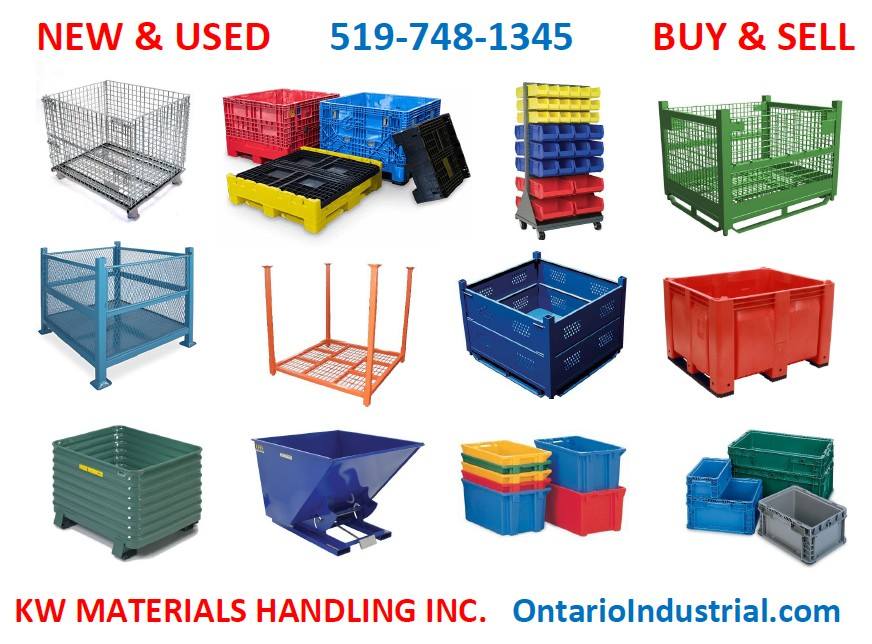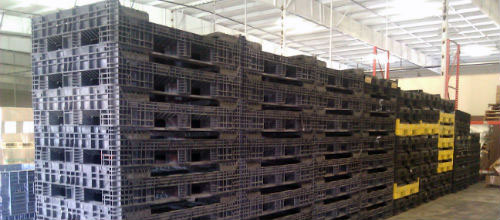Why used bulk containers are efficient for large-scale material management
Wiki Article
The Ultimate Overview to Picking the Right Bulk Containers for Your Company Requirements
Choosing the ideal mass containers is vital for any kind of company that depends on efficient logistics. Various kinds of containers exist, each designed for particular materials and applications. Variables such as dimension, product compatibility, and governing requirements play a substantial role in this decision-making procedure. Recognizing these components can lead to improved functional performance. Many businesses neglect necessary elements that might boost their general efficiency and sustainability. What are these considerations?Recognizing Different Sorts Of Bulk Containers
Mass containers work as essential tools for services looking for efficient storage and transportation options. These containers can be found in various kinds, each created to satisfy particular functional requirements. One typical type is the intermediate bulk container (IBC), which is perfect for liquid and granulated materials, supplying a balance of capability and maneuverability. Another popular choice is the mass bag, or FIBC, appropriate for dry, flowable items. These flexible containers are lightweight and can be conveniently delivered and kept. For much heavier products, inflexible mass containers are often used, offering longevity and stability for risk-free handling. In addition, there are specific containers tailored for hazardous products, making certain conformity with safety laws. Understanding the distinct attributes of these mass container types allows companies to make educated decisions that optimize logistics and reduce prices. By picking the best container, business can boost their operational effectiveness and streamline their supply chain procedures.Trick Material Considerations for Mass Containers
When choosing bulk containers, it is vital to consider the products utilized in their construction. Elements such as stamina, chemical, and longevity compatibility play an essential role in ensuring the containers fulfill details operational needs. In addition, weight and transportability concerns can affect both performance and transportation logistics.Material Toughness and Toughness
Resilience and toughness are critical consider selecting products for bulk containers, as they straight influence the container's capacity to stand up to various environmental conditions and dealing with processes. Materials such as high-density polyethylene (HDPE), polypropylene, and stainless-steel are typically favored for their robust residential or commercial properties, supplying resistance to temperature, abrasion, and influence fluctuations. The option of product additionally impacts the total life-span of the container; stronger products usually cause less frequent substitutes, resulting in set you back financial savings gradually. Furthermore, the weight of the material can influence delivery costs and convenience of handling. Businesses should consider their details functional atmospheres and the possibility for deterioration to assure peak longevity and stamina in their mass container option.Chemical Compatibility Aspects
Comprehending chemical compatibility is vital for picking mass containers, as the products used need to stand up to the certain substances they will certainly hold. Numerous variables affect compatibility, including the chemical nature of the contents, temperature level, and period of storage space. For instance, destructive chemicals might need containers made from stainless steel or specialized plastics that withstand destruction. In addition, reactive materials can generate warmth or gases, requiring aired vent or pressure-rated containers. The choice of container product, whether polycarbonate, steel, or polyethylene, ought to line up with the chemical homes of the saved compounds to avoid leaks or breaches. Inevitably, a comprehensive examination of these compatibility factors guarantees safe handling and storage space, shielding both employees and the environment while maintaining product integrity.Weight and Portability Issues
Choosing bulk containers entails not just evaluating chemical compatibility however also taking into consideration weight and portability. Companies need to analyze the simplicity of handling and transportation to enhance effectiveness. Light-weight materials like high-density polyethylene (HDPE) or light weight aluminum can facilitate easier motion and decrease shipping costs. Conversely, much heavier containers may provide enhanced sturdiness but can prevent flexibility, especially in settings needing regular moving. Furthermore, the style of the container ought to enable for convenient training and stacking, making certain ergonomic safety and security for employees. Companies ought to additionally think about the framework offered for transportation; for instance, containers compatible with forklifts or pallet jacks can enhance operations. Eventually, the right equilibrium between weight and portability straight influences functional efficiency and cost efficiency.Sizing Your Bulk Containers for Optimal Performance
When sizing mass containers, companies must meticulously analyze the measurements called for to accommodate their specific items. Additionally, weight ability is an important factor that affects performance and security throughout transport and storage. Effective sizing not only takes full advantage of area however also maximizes operational workflows.Establishing Container Dimensions
Selecting the ideal measurements for mass containers is important for making best use of effectiveness in storage and transportation. Businesses should evaluate their particular requirements, considering elements such as available space, the nature of the items being kept, and the methods of transport made use of. Exact measurements assure that containers fit ideally in storehouses and cars, decreasing wasted space and reducing handling time. Requirement sizes can offer ease, yet custom-made measurements could be needed for special demands or to fit details products. In addition, it is crucial to examine piling capabilities and accessibility, as these aspects affect overall operational effectiveness. Inevitably, the appropriate dimensions lead to enhanced company and structured logistics, benefiting the general efficiency of the business.Weight Capability Considerations
Comprehending weight ability is crucial for companies intending to optimize their bulk container effectiveness. The weight ability of a container directly influences storage capacities, transport logistics, and overall functional prices. Selecting containers with the proper weight limits assures that organizations can securely store and move their items without risking damage or compliance problems. Overloading containers can lead to structural failures, while underutilizing capability cause squandered sources. When picking containers, it is vital for organizations to analyze their item weights and think about any governing requirements. Additionally, factors such as the kind of product, meant usage, and ecological problems ought to also influence weight ability decisions. By examining these aspects, companies can improve performance and ensure a streamlined supply chain.Regulatory Compliance and Safety Standards

Regulative conformity and safety and security criteria play an important role in the selection of mass containers for services. Organizations must ensure that their containers satisfy numerous regulations established by local, nationwide, and international authorities. These criteria commonly concern product safety and security, structural integrity, and correct labeling, which aid avoid mishaps and ensure the safe transport of products.
Additionally, adherence to industry-specific standards, such as those from the Fda (FDA) or the Occupational Safety and Health And Wellness Administration (OSHA), is essential for business handling unsafe materials or foodstuff. Non-compliance can lead to fines, lawful concerns, or damage to a company's online reputation.
Services must additionally consider the container's compatibility with the products being saved or transported to prevent contamination or chain reaction (used collapsible bulk containers). To sum up, recognizing and applying regulative compliance and safety and security criteria is necessary for the efficient and accountable use bulk containers
Sustainability Choices for Eco-Friendly Bulk Containers

Companies are likewise checking out choices made from recycled products, which not just preserve sources however also support the recycling sector. Moreover, technologies in style permit for lighter containers that need less power to transport, even more improving sustainability. By incorporating these green bulk container alternatives, organizations can demonstrate their dedication to environmental stewardship while meeting consumer need for sustainable methods. This change not just aids the world but can additionally boost brand reputation and consumer loyalty.
Cost-Effectiveness and Budgeting for Mass Containers
While numerous organizations concentrate on sustainability, cost-effectiveness continues to be a crucial element when choosing mass containers. Organizations should analyze the preliminary acquisition cost, in addition to long-lasting functional prices, to guarantee financial practicality. Variables such as upkeep, reusability, and longevity play a considerable function in establishing total expenditures.Purchasing high-grade containers might generate greater in advance prices yet can result in financial savings through lowered substitute prices and reduced waste. Furthermore, companies must take into consideration transport expenses and storage performance, as these can affect the general spending plan.

Frequently Asked Questions
How Do I Establish the Right Container for Hazardous Products?
To figure out the best container for unsafe products, one have to assess compatibility with the substance, think about the container's material, look for regulative conformity, and analyze capability and safety functions to guarantee appropriate handling and storage space.Can Mass Containers Be Personalized for Certain Products?
Yes, bulk containers can be personalized for details products. refurbished bulk containers. Various attributes, such as material, size, and design, can be tailored to meet distinct needs, ensuring suitable safety and performance for transferring and storing various itemsWhat Is the Average Lifespan of Various Bulk Container Kind?
The typical lifespan of bulk container types varies; plastic containers last 5-10 years, steel containers 10-20 years, and wood containers commonly last 3-7 years, depending on use, maintenance, and ecological conditions.Just how Should I Clean and Maintain Bulk Containers?
To cleanse and keep bulk containers, one need to regularly check for damage, get rid of website residue, wash with proper cleaning agents, rinse completely, and guarantee appropriate drying out prior to storage. Following supplier standards enhances longevity and safety throughout use.Exist Rental Choices for Bulk Containers Available?
Yes, various business offer rental alternatives for bulk containers, providing versatility for companies. These rentals can accommodate numerous needs, permitting firms to take care of supply effectively without the commitment of purchasing containers outright.Durability and stamina are essential aspects in selecting products for mass containers, as they directly influence the container's capability to hold up against various ecological conditions and handling procedures. Recognizing chemical compatibility is vital for selecting mass containers, as the materials used need to stand up to the certain materials they will certainly hold. Recognizing weight ability is important for businesses intending to enhance their bulk container efficiency. Regulative compliance and safety and security criteria play an essential role in the choice of mass containers for businesses. While several organizations concentrate on sustainability, cost-effectiveness remains an important element when selecting bulk containers.
Report this wiki page